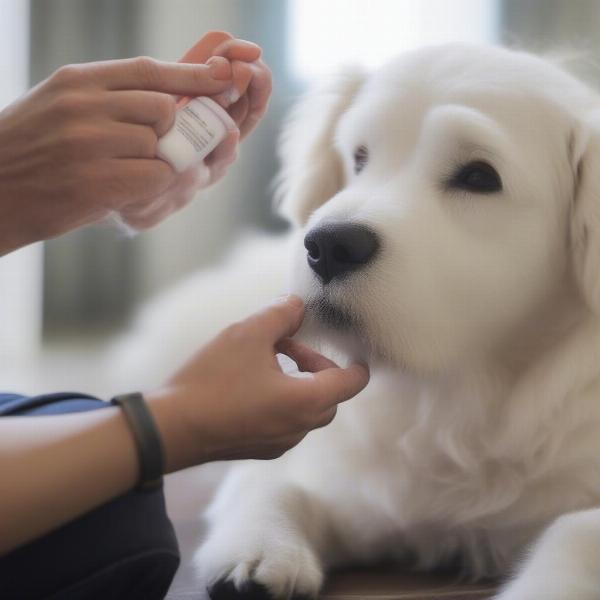Piriton, also known as chlorpheniramine maleate, is an antihistamine commonly used to treat allergies in humans. But can you give it to your dog? And if so, what’s the correct piriton dose for dogs? This comprehensive guide will delve into everything you need to know about using Piriton for dogs, including appropriate dosages, potential side effects, and when to seek veterinary advice.
Understanding Piriton and its Use in Dogs
Piriton works by blocking the effects of histamine, a chemical released by the body during an allergic reaction. In dogs, allergic reactions can manifest in various ways, including itching, skin rashes, sneezing, and watery eyes. Piriton can help alleviate these symptoms, providing relief from the discomfort caused by allergies. However, it’s crucial to consult your veterinarian before administering Piriton to your dog. They can determine the underlying cause of your dog’s allergies and advise on the appropriate dosage and treatment plan.
Determining the Correct Piriton Dose for Dogs
The appropriate piriton dose for dogs varies depending on factors such as weight, age, and the severity of the allergic reaction. A general guideline is 0.2-0.4mg of Piriton per pound of body weight, administered every 8-12 hours. However, it’s essential to follow your veterinarian’s specific recommendations, as they can tailor the dosage to your dog’s individual needs. Never exceed the recommended dose, as this could lead to adverse effects. dog piriton tablets discusses this further.
How to Administer Piriton to Your Dog
Piriton is available in tablet form. You can administer the tablet directly to your dog or crush it and mix it with their food. If your dog is reluctant to take the tablet, try hiding it in a small piece of cheese or meat. Always ensure your dog has access to fresh water.
 Administering Piriton to a dog
Administering Piriton to a dog
Potential Side Effects of Piriton in Dogs
While generally safe, Piriton can cause some side effects in dogs. These can include drowsiness, dry mouth, and decreased appetite. In rare cases, more severe side effects such as vomiting, diarrhea, and seizures can occur. If you notice any unusual symptoms after administering Piriton to your dog, contact your veterinarian immediately. More information on potential side effects can be found on dog piriton.
When to Seek Veterinary Advice
It’s crucial to consult your veterinarian before giving Piriton to your dog, especially if they have any underlying health conditions. Your vet can diagnose the cause of your dog’s allergies and recommend the most appropriate treatment. how much piriton for dogs provides further details on this topic. Additionally, seek immediate veterinary attention if your dog experiences any severe side effects after taking Piriton.
Conclusion
Piriton can be a helpful tool in managing allergic reactions in dogs, providing relief from itching, skin irritation, and other allergy symptoms. However, it’s crucial to consult with your veterinarian before administering Piriton to your dog. They can determine the appropriate piriton dose for dogs based on their individual needs and monitor for any potential side effects. Remember to always follow your veterinarian’s instructions carefully. For further reading, visit dog dose piriton.
FAQ
- Can I give my dog human Piriton? While the active ingredient is the same, it’s always best to consult your veterinarian before giving your dog any human medication.
- What should I do if my dog overdoses on Piriton? Contact your veterinarian or an emergency animal hospital immediately.
- How long does it take for Piriton to work in dogs? You should see an improvement in your dog’s allergy symptoms within 1-2 hours.
- Can Piriton be given long-term to dogs? Your veterinarian will determine the appropriate duration of treatment based on your dog’s individual needs.
- Are there any alternatives to Piriton for dogs with allergies? Yes, there are other antihistamines and medications available. Your veterinarian can discuss these options with you.
- Can I give my dog Piriton if they are pregnant or nursing? Consult your veterinarian before giving Piriton to a pregnant or nursing dog.
- What are the signs of an allergic reaction in dogs? Common signs include itching, skin rashes, sneezing, watery eyes, and paw licking.
ILM Dog is your trusted partner in dog care. We offer expert advice on dog breeds, health, training, nutrition, grooming, and much more. Whether you’re a new dog owner or a seasoned pro, our comprehensive resources empower you to provide the best possible care for your furry friend. We specialize in Dog Breeds and Selection, Health and Medical Care, Training and Behavior, Nutrition and Feeding, Grooming and Hygiene, and Products and Accessories. Contact us today for personalized guidance and support! Email: [email protected] Phone: +44 20-3965-8624 Visit ILM Dog for more information.